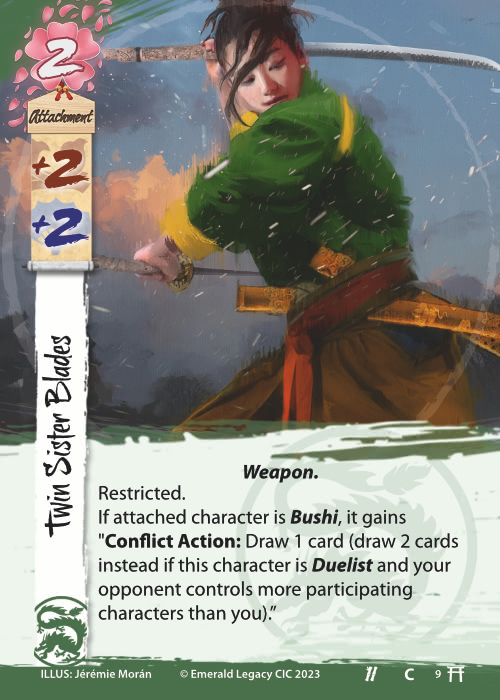Legend of the Five Rings is a game about fantastical samurai and their drama. The hardship and glory of war, the scheming and dealing of politics, the might and awe of the elements… and the focused intensity of duels. One against one, the whole world disappears, righteousness is made evident by the blood spilled in its defense.
With the new core set, the rules framework around duels will change. The goal is to make duels a special part of the game, with the high stakes feeling that duels carry in fiction. We also develop a deeper framework around it to make duels easier to interact with, but without losing their unique character. A conflict is not a duel, and a duel is not a conflict.
A Moment of Truth – Printed Skill
Starting with the release of the new core set, all duels use the printed skill of the characters involved. A duel is the most fundamental clash between two warriors: they walk in with no armor, their followers sit aside, their fame or infamy is forgotten, only their valor can determine the winner. To clarify, we use printed skill, not base skill: the printed value is completely impossible to be modified.
By basing duels on printed skill we flatten the range of the starting statistic of the characters. This reduces the potential for “bully dueling”. When duels count current skill, the range fluctuates from 0 up to 12 or even higher (e.g with the help of events). When duels count printed skill the range stays around 0 to 6. The reduced range dramatically increases the impact of bidding during duels.
For the opponents, the use of printed skill moves the dynamic around avoiding duels: instead of dodging them through towering their characters or playing cards that increase skill, opponents must dodge duels by being careful with how they commit their characters. This increases the value of movement, a type of effect that traditionally didn’t do that much.
For the duelist, this change modifies the dynamic around deck composition, and as a consequence, it also changes their strategies during play. If duels care about printed skill, the need for increasing the skill of your duelist characters is greatly reduced. Duels can be fought without needing to be the biggest character in the field. Deck slots that had to be spent on attachments can be spent on other types of effects, while character selection becomes more important.
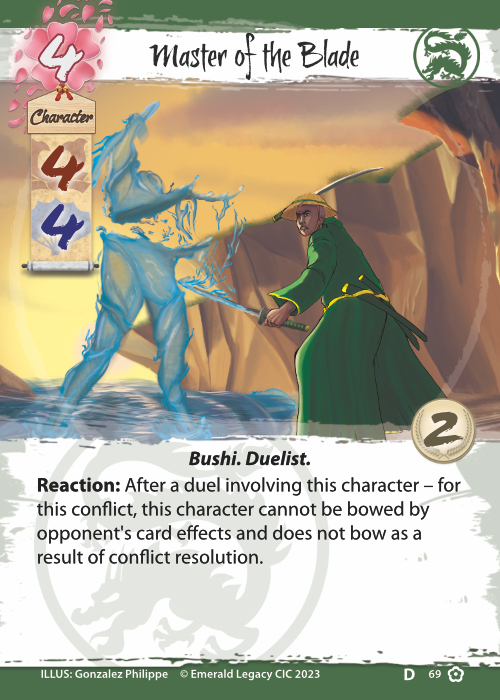
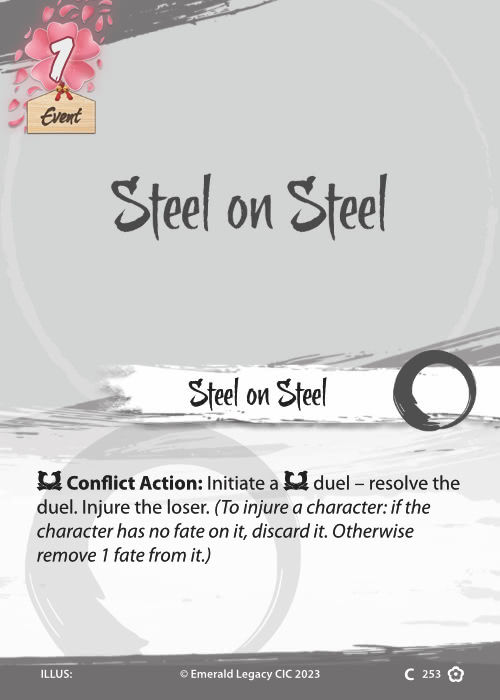
Last, this change completely decouples the ability to win duels from the ability to win conflicts. A card that helps you win conflicts is not the same card that would help you win duels. Duels truly become their own special thing.
Sharp Wits and Fast Blades – Enriching the Duel Framework
Together with this change, we restructure the Duel Framework to have fewer steps and clear points of interaction. We also introduce three new types of Triggered Ability.
- Duel Challenge: this triggers after a duel initiates, but before bids are chosen. Common uses are changing the participants of the duel, the statistic used in the duel, or giving bonuses to be used later during the duel resolution.
- Duel Focus: this triggers after both bids are revealed, but before honor is transferred. Common uses are to adjust the bid itself, giving bonuses for duel resolution, or effects that depend on what the bids are.
- Duel Strike: this triggers after the duel results are calculated, but before the effects for winning or losing are resolved. Common uses are changing the effects of the duel, or other effects that depend on knowing who won or lost.
Each player involved in a duel can play a single one of those Triggered Abilities per type per duel. You can play one Duel Challenge and one Duel Focus, but you cannot play two Duel Focus.
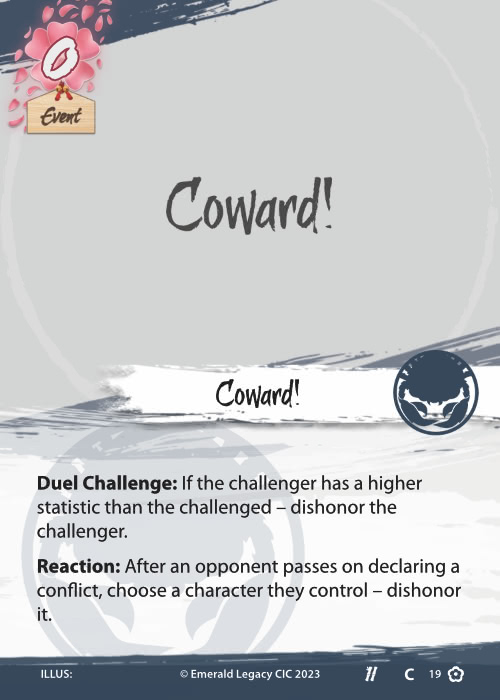
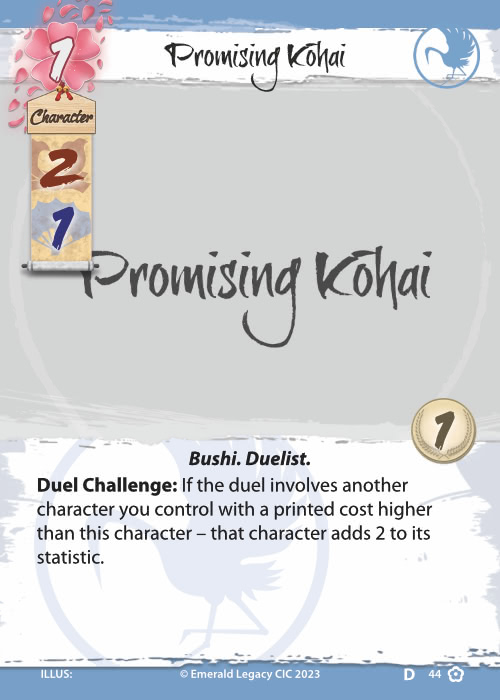
Those abilities can be canceled normally by anything that would be able to cancel their card type. Other Reactions and Interrupts can still be used normally during a duel.
Migrating to the New Framework – The Old Cards
Duel effects released before this core set will also follow the new rules.
Any duel that references a character skill (or glory) should be interpreted as using the printed value. Any duel that substituted the statistic of the duel, should use whatever statistic the card defines to use (e.g. True Strike Kenjutsu).
Any duel that directly modifies the statistics of the duel, should apply those modifiers to the duel result instead (e.g. Challenge on the Fields).
We understand this is a big change that shakes the balance of all duels released previously. We encourage the players to explore the card base again, as cards that were good can now be bad, and cards that were bad can now be good.
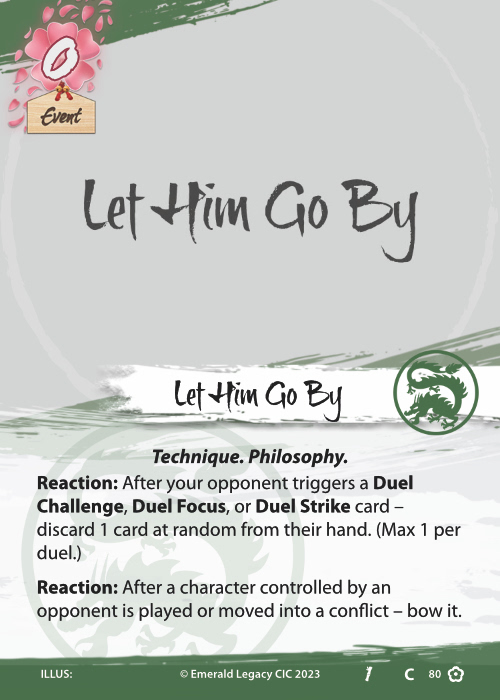
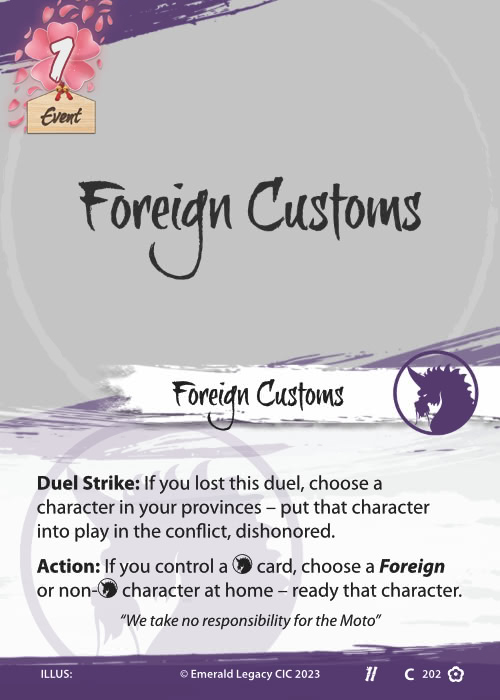
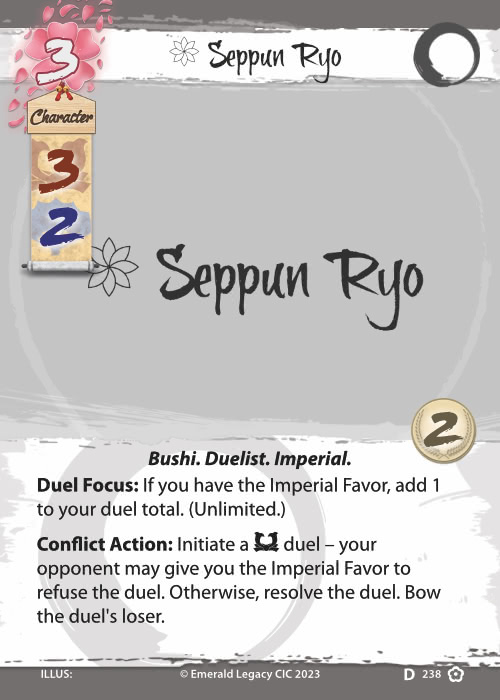
The One Left Behind – Errata to Twin Sister Blades
With the changes to the framework there is one card that must be addressed and will receive an errata when Emerald Core Set is released. That card is Twin Sister Blades. With the flattening of the skill range around duels, Twin Sister Blades invalidates the whole duel framework and turns all duels into automatic victories. That card is receiving a complete errata, becoming a different concept.
